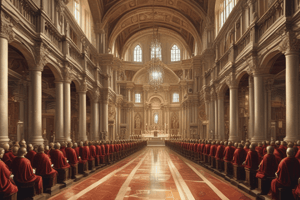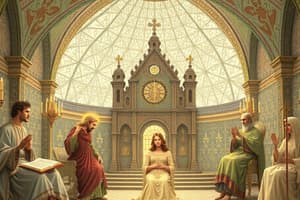Podcast
Questions and Answers
What is an Ecumenical Council primarily composed of?
What is an Ecumenical Council primarily composed of?
- Nuns and monks from various monasteries
- Only Catholic cardinals and the Pope
- Laypeople and priests from local parishes
- Theological experts and apostolic dignitaries from around the world (correct)
What is believed to be guiding the proceedings of an Ecumenical Council?
What is believed to be guiding the proceedings of an Ecumenical Council?
- The Holy Spirit (correct)
- The authority of the Pope
- The collective wisdom of the bishops
- The vote of the laity
Who summons the bishops to an Ecumenical Council?
Who summons the bishops to an Ecumenical Council?
- The local parish priests
- The Holy Spirit
- The College of Cardinals
- The Pope (correct)
What is the outcome of an Ecumenical Council?
What is the outcome of an Ecumenical Council?
Where was the First Council of Nicaea held?
Where was the First Council of Nicaea held?
What was the outcome of the First Council of Nicaea?
What was the outcome of the First Council of Nicaea?
What was rejected by the First Council of Nicaea?
What was rejected by the First Council of Nicaea?
How many bishops attended the First Council of Nicaea?
How many bishops attended the First Council of Nicaea?
How many years did the Council of Trent last?
How many years did the Council of Trent last?
Who oversaw the Council of Trent?
Who oversaw the Council of Trent?
What was the primary purpose of the Council of Trent?
What was the primary purpose of the Council of Trent?
What is notable about the Council of Trent in terms of its duration and decrees?
What is notable about the Council of Trent in terms of its duration and decrees?
What was the Council of Trent convoked to do?
What was the Council of Trent convoked to do?
Study Notes
Ecumenical Council
- An assembly of apostolic dignitaries and theological experts summoned to discuss and resolve Church doctrine and practice matters.
- Representing the entire global Catholic community, these councils secure the consent of the whole Church.
- Comprises Catholic bishops from around the world, invited by the Pope to deliberate on Church matters alongside him.
Significance of Ecumenical Councils
- Crucial for resolving numerous Church issues, clarifying beliefs, and addressing doctrinal threats.
Divine Guidance
- Believed to be guided by the Holy Spirit, ensuring the proceedings of these councils are divinely inspired.
The First Council of Nicaea
- Held in Nicaea, Bithynia (present-day Turkey) in 325 C.E.
- Convened by Roman Emperor Constantine I
- Attended by 318 bishops
Key Outcomes
- Resulted in the first uniform Christian doctrine, known as the Nicene Creed
- Rejected Arianism, a heresy that denied the divinity of Christ by claiming He was created by the Father
Ecclesiastical Hierarchy
- Recognized the primacy of the sees of Rome, Alexandria, and Antioch
- Granted the See of Jerusalem a position of honor
The Council of Trent
- Lasted for 18 years under the oversight of 5 Popes: Paul III, Julius III, Marcellus II, Paul IV, and Pius IV
- Held during the reign of 2 Emperors: Charles V and Ferdinand
- Convened to address errors spread by Luther and other Reformers, aiming to reform the Church's discipline
- Holds the record as the longest-lasting ecumenical council in history
- Issued the largest number of dogmatic and reformatory decrees of any council
Studying That Suits You
Use AI to generate personalized quizzes and flashcards to suit your learning preferences.
Description
A quiz on Ecumenical Councils, which are conferences of Catholic bishops and experts assembled to discuss and settle matters of Church doctrine and practice.




